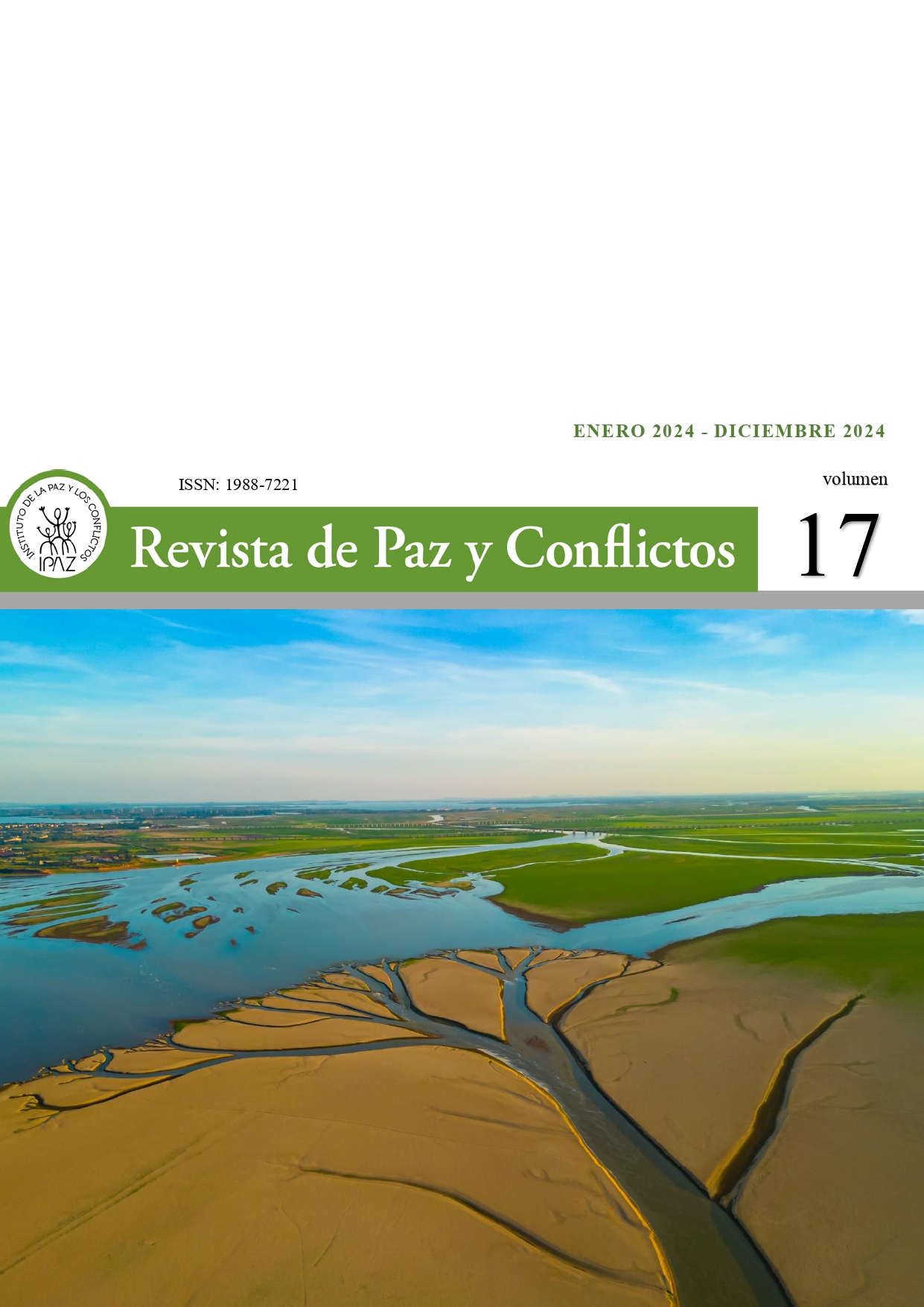IA, lucha antiterrorista y gobernanza mundial: estado de la cuestión
DOI:
https://doi.org/10.30827/revpaz.17.31319Palabras clave:
Lucha antiterrorista, Inteligencia Artificial, Gobernanza mundial, Derechos HumanosResumen
Este artículo ilustra el modo en que la emergente gobernanza mundial de la IA aborda actualmente su uso en la lucha contra el terrorismo. Muestra que la lucha antiterrorista representa una excepción problemática en muchas de las normativas legales sobre IA que están surgiendo. Al mismo tiempo, aunque se aborda de algún modo en los informes y buenas prácticas de la lucha antiterrorista, también se echa problemáticamente en falta una conversación jurídica sobre la IA dentro de la arquitectura mundial de la lucha antiterrorista. El artículo termina haciendo un llamamiento urgente a las instituciones internacionales para que hagan más por regular el uso de la IA en la lucha antiterrorista, ya que esta tecnología puede implicar riesgos importantes en términos de abusos de los derechos humanos por parte de actores más poderosos.
Descargas
Citas
Bakker, E. (2015). Terrorism and Counterterrorism Studies. Comparing Theory and Practice. Leiden University Press.
Bellanova, R., Jacobsen, K. L., & Monsees, L. (2020). Taking the trouble: Science, technology and security studies. Critical Studies on Security, 8(2), 87–100. https://doi.org/10.1080/21624887.2020.1839852
Bernáth, L. (2021). Can Autonomous Agents Without Phenomenal Consciousness Be Morally Responsible? Philosophy & Technology, 34(4), 1363–1382. https://doi.org/10.1007/s13347-021-00462-7
Bigo, D., & Tsoukala, A. (Eds.). (2008). Terror, Insecurity and Liberty: Illegal practices of Liberal Regimes after 9/11. Routledge.
Boulden, J., & Weiss, T. G. (Eds.). (2004). Terrorism and the UN: Before and After September 11. Indiana University Press.
Buzan, B., Wæver, O., & de Wilde, J. (1998). Security: A New Framework for Analysis. Lynne Rienner Publishers.
Chen, A., & Chander, S. (2021, May 20). Automating Bias? The Risks of the EU’s New AI Regulation. Green Journal Europe. https://www.greeneuropeanjournal.eu/automating-bias-the-risks-of-the-eus-new-ai-regulation/
Crosset, V., & Dupont, B. (2022). Cognitive assemblages: The entangled nature of algorithmic content moderation. Big Data & Society, 9(2), 205395172211433. https://doi.org/10.1177/20539517221143361
Cupać, J., & Sienknecht, M. (2024). Regulate against the machine: How the EU mitigates AI harm to democracy. Democratization, 1–24. https://doi.org/10.1080/13510347.2024.2353706
Erskine, T. (2024). AI and the future of IR: Disentangling flesh-and-blood, institutional, and synthetic moral agency in world politics. Review of International Studies, 50(3), 534–559. https://doi.org/10.1017/S0260210524000202
Ganor, B. (2021). Artificial or Human: A New Era of Counterterrorism Intelligence? Studies in Conflict & Terrorism, 44(7), 605–624. https://doi.org/10.1080/1057610X.2019.1568815
Gutiérrez, M., & Díaz-Sanz, M. (2024). Deperipheralisation of people and states in the algorithmic assemblage: Court cases and a proposal for a new social contract. Geografiska Annaler: Series B, Human Geography, 106(1), 10–27. https://doi.org/10.1080/04353684.2023.2182226
Heikkilä, M. (2024, March 5). Nobody knows how AI works. MIT Technology Review. https://www.technologyreview.com/2024/03/05/1089449/nobody-knows-how-ai-works/
Hirsh, M. (2023, April 11). How AI will revolutionize warfare. Foreign Policy. https://foreignpolicy.com/2023/04/11/ai-arms-race-artificial-intelligence-chatgpt-military-technology/
Jackson, R. (Ed.). (2016). Routledge Handbook of Critical Terrorism Studies. Routledge.
Jackson, R., Breen-Smyth, M., Gunning, J., & Jarvis, L. (2011). Terrorism: A Critical Introduction. Palgrave Macmillan.
Johnson, J. (2019). The AI-cyber nexus: Implications for military escalation, deterrence and strategic stability. Journal of Cyber Policy, 4(3), 442–460. https://doi.org/10.1080/23738871.2019.1701693
Johnson, J. (2022). Delegating strategic decision-making to machines: Dr. Strangelove Redux? Journal of Strategic Studies, 45(3), 439–477. https://doi.org/10.1080/01402390.2020.1759038
Lacy, M. (2024). The future of control/The control of the future: Global (dis)order and the weaponisation of everywhere in 2074. Review of International Studies, 50(3), 560–578. https://doi.org/10.1017/S0260210524000093
Lakomy, M. (2023). Artificial Intelligence as a Terrorism Enabler? Understanding the Potential Impact of Chatbots and Image Generators on Online Terrorist Activities. Studies in Conflict & Terrorism, 1–21. https://doi.org/10.1080/1057610X.2023.2259195
Lesko, L., & Silic, M. (2023). Artificial Intelligence and (Counter)Terrorism. Global Journal of Business and Integral Security, 1–7.
Nelu, C. (2024, June 10). Exploitation of Generative AI by Terrorist Groups. International Centre for Counter-Terrorism (ICCT). https://www.icct.nl/publication/exploitation-generative-ai-terrorist-groups
Priyank Mathur, Broekaert, C., & Clarke, C. P. (2024, May 1). The Radicalization (and Counter-radicalization) Potential of Artificial Intelligence. International Centre for Counter-Terrorism (ICCT). https://www.icct.nl/publication/radicalization-and-counter-radicalization-potential-artificial-intelligence
RAN C&N. (2022). What’s going on online? Dealing with (potential) use of deepfake technology by extremists (RAN Practitioners, pp. 1–9). RAN.
Roberts, H., Hine, E., Taddeo, M., & Floridi, L. (2024). Global AI governance: Barriers and pathways forward. International Affairs, 100(3), 1275–1286. https://doi.org/10.1093/ia/iiae073
Saul, B. (2006). Defining Terrorism in International Law. Oxford University Press.
Smuha, N. A. (2021). From a ‘race to AI’ to a ‘race to AI regulation’: Regulatory competition for artificial intelligence. Law, Innovation and Technology, 13(1), 57–84. https://doi.org/10.1080/17579961.2021.1898300
Suchman, L. (2020). Algorithmic warfare and the reinvention of accuracy. Critical Studies on Security, 8(2), 175–187. https://doi.org/10.1080/21624887.2020.1760587
Townshend, C. (2011). Terrorism: A Very Short Introduction. Oxford University Press.
Tuteja, V., & Marwaha, S. S. (2023). Artificial intelligence: Threat of terrorism and need for better counter-terrorism efforts. International Journal of Creative Computing, 2(1), 87–100. https://doi.org/10.1504/IJCRC.2023.133551
UNICRI & UNCCT. (2021). Algorithms and terrorism. The malicious use of artificial intelligence for terrorist purposes (Cybersecurity and New Technologies, p. 58). UNICRI & UNCCT. https://www.un.org/counterterrorism/cct/programme-projects/cybersecurity
Veale, M., Matus, K., & Gorwa, R. (2023). AI and Global Governance: Modalities, Rationales, Tensions. Annual Review of Law and Social Science, 19(1), 255–275. https://doi.org/10.1146/annurev-lawsocsci-020223-040749
Descargas
Publicado
Cómo citar
Número
Sección
Licencia
Derechos de autor 2025 Revista de Paz y Conflictos

Esta obra está bajo una licencia internacional Creative Commons Atribución 4.0.
Esta obra está bajo una licencia internacional Creative Commons Atribución 4.0.














